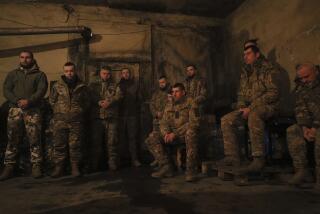Diplomacy, Defiance in Iraq
- Share via
TIKRIT, Iraq — Tens of thousands of armed men marched here in President Saddam Hussein’s home city Saturday, vowing to defend him to the death, shortly before the two top U.N. weapons inspectors met with Iraqi officials and called on them to produce “substance” to meet international demands that Iraq disarm.
In order that Iraq assuage the U.N. Security Council’s demands, Hans Blix and Mohamed ElBaradei were expecting the regime to start turning over to weapons inspectors hard evidence such as files, names of people to be interviewed, documents and remnants of destroyed weapons if they exist, a senior U.N. official said while briefing reporters in Baghdad.
Although details were sketchy after the chief inspectors’ meeting with the Iraqi side, which lasted 4 1/2 hours late Saturday, there were preliminary indications of progress, including the hand-over of some documents, a U.N. source said.
The normally cautious Blix called the talks “useful ... very substantial discussions” after the meeting at the Foreign Ministry with Gen. Amir Saadi, a presidential advisor and the Iraqi official in charge of cooperation with the weapons inspectors. The Iraqis are “providing explanations on some of the issues,” added ElBaradei.
U.N. officials planned to examine the newly handed-over documents during the night and discuss them with the Iraqi officials during a meeting today.
Blix, head of the U.N. Monitoring, Verification and Inspection Commission, and ElBaradei, chief of the International Atomic Energy Agency, flew to Baghdad from Cyprus -- their second trip to Iraq in three weeks -- at the request of the Iraqi government, which said it wanted technical discussions to resolve the gaps presented by the inspectors in their reports to the Security Council on Jan. 27.
Since then, Iraq has been accused in a searing report, presented Wednesday at the United Nations by Secretary of State Colin L. Powell, of continuing to seek biological, chemical and nuclear weapons and the means to deliver them. President Bush has said that “the game is up,” amid signs that the U.S. government now considers war with Iraq all but inevitable.
In that atmosphere, the two-day visit by Blix and ElBaradei appears to be a crucial chance for Iraqi authorities to come clean on alleged weapons programs or face the consequences, although ElBaradei denied that it is a “last chance.”
Speaking on the basis of anonymity before Saturday’s meeting, senior U.N. officials in Baghdad said Iraq already has signaled that it will resolve some of the procedural problems Blix and ElBaradei have raised, but that alone is unlikely to satisfy the international community.
“We are looking for evidence rather than just talks,” one official said.
The three main “process” issues raised by the inspectors -- making Iraqi scientists available for private interviews, allowing U-2 spy plane overflights to support the inspection teams on the ground and enacting legislation banning weapons of mass destruction on Iraqi territory, as long promised -- can be solved relatively quickly, the official said. However, the mood of the international community requires more substantive steps, he said.
Chief among the “substance” questions to be addressed are the gaps in Iraq’s accounting of its banned weapons -- for instance, the discrepancy between the amount of nerve agents it is known to have possessed in the early 1990s and the amount that can be confirmed as destroyed. The U.N. officials said the inspectors will need to see documents, hear more witnesses outside of earshot of Iraqi minders and get other evidence to support claims by Baghdad that all the forbidden materials have been destroyed.
Just before the Iraqi officials launched their talks with Blix and ElBaradei in Baghdad, the government organized a massive military rally in Tikrit, the city about 100 miles north of Baghdad that is the native soil of not only Hussein but also most of Iraq’s ruling circle.
In a stadium festooned with banners praising the Iraqi leader, dignitaries, students and invited guests watched tens of thousands of Iraqi soldiers, militia troops and volunteers march to the beat of a military band for more than two hours.
The marchers brandished rifles or carried bazookas and mortar tubes on their shoulders, as women in the stands ululated to show their dedication to their leader.
Rather than being afraid of a U.S.-led war, participants and spectators said that they are ready for a conflict and that Iraq would be victorious because no foreign power would be capable of occupying and surviving in their country.
“If [Bush] wants to get rid of our president, he will have to get rid of all Iraqis. And this is impossible, because we will never give up,” said Iman Khalad, a 22-year-old recent college graduate whose father is a tax official in Tikrit. She and her brother have volunteered to fight for the government if necessary and have received military training, she said.
“We are going to beat them with whatever we have in our hands because we have faith,” said Saadi Yakob, a self-employed 40-year-old from Tikrit wearing a red-and-white kaffiyeh headdress and bearing an almost uncanny resemblance to the president.
Saturday offered a rare chance for foreign journalists to visit Tikrit, an agricultural market city close to the Tigris River and near the village of Owja, where Hussein was born in 1937. The city boasts stately mosques and palaces, wide and well-paved boulevards, a university and a five-star hotel.
Comparisons between Hussein and another Tikrit native, the Kurdish general Saladin, who recaptured Jerusalem during the Crusades, are frequent in Iraq. As if hoping that history will repeat itself, many of the fighters who vowed Saturday to struggle for Hussein had pinned drawings of Jerusalem’s Al Aqsa mosque on their uniforms.
More to Read
Sign up for Essential California
The most important California stories and recommendations in your inbox every morning.
You may occasionally receive promotional content from the Los Angeles Times.













